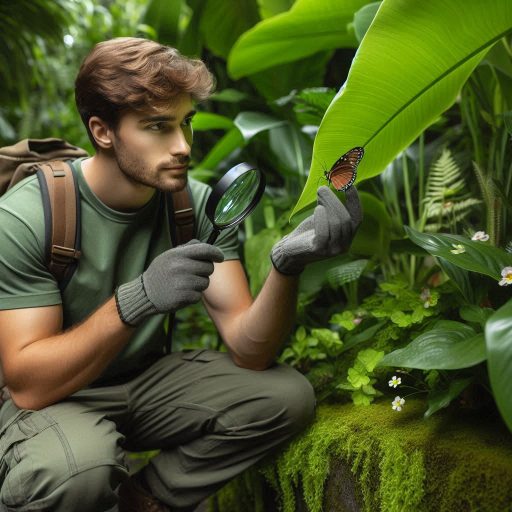Introduction
Career transitions can be both exciting and daunting.
For many, moving from biology to ecology represents a significant shift.
Biology provides a strong foundation in the life sciences.
It covers essential concepts about living organisms and their interactions.
Ecology, on the other hand, focuses on ecosystems and environmental relationships.
This transition opens doors to diverse career paths within science.
Exploring different avenues within the scientific field is crucial for personal and professional growth.
Ecology offers unique opportunities to engage in research, conservation, and environmental management.
Professionals in this field tackle pressing global issues, such as climate change and habitat loss.
They contribute to sustainability efforts and strive to protect biodiversity.
However, transitioning to ecology presents its own challenges.
The shift may require additional education or specialized training.
New skills in data analysis, fieldwork, and ecological modeling might be necessary.
Adapting to different methodologies can be daunting.
Networking with professionals in the ecology field is vital.
It helps build connections and gain insights into potential career paths.
Despite the challenges, the opportunities in ecology are abundant.
A career in ecology can be fulfilling and impactful.
It allows you to apply your biology knowledge while making a difference in the world.
Embracing this transition can lead to a rewarding and meaningful career.
Background on Biology and Ecology
Overview of the Differences Between Biology and Ecology
Biology and ecology are distinct yet interconnected fields of study.
Biology focuses on living organisms and their life processes.
It explores the structure, function, growth, and evolution of all forms of life.
In contrast, ecology examines the relationships between organisms and their environments.
It studies how living beings interact with each other and their surroundings.
While biology delves into the details of individual organisms, ecology takes a broader perspective.
It considers populations, communities, and ecosystems.
Understanding both fields is crucial for grasping life‘s complexity.
Interconnectedness of Biology and Ecology
Biology and ecology complement each other in many ways.
For instance, biologists study specific species, while ecologists analyze how those species interact within ecosystems.
This collaboration helps scientists understand biodiversity and ecosystem dynamics.
The interconnectedness of these fields is evident in their shared goals.
Both aim to explain life processes and environmental interactions.
As such, knowledge in one area enhances understanding in the other.
For example, a biologist’s insights on a species’ physiology can inform an ecologist about its ecological role.
Common Skills and Knowledge Transferable Between Biology and Ecology
Many skills and knowledge areas transfer between biology and ecology.
Critical thinking is essential in both fields.
Biologists analyze data to understand organism behavior, while ecologists evaluate interactions within ecosystems.
This analytical mindset is crucial for problem-solving in various contexts.
Research skills also bridge these disciplines.
Both biologists and ecologists collect and analyze data.
They use similar methodologies to conduct experiments and observations.
Knowledge of statistical analysis is vital for interpreting results in both fields.
Fieldwork experience is another commonality.
Both biologists and ecologists often conduct research outdoors.
This hands-on experience develops observational skills and an understanding of natural environments.
Such skills are invaluable when studying living organisms and their ecosystems.
Communication is crucial in both biology and ecology.
Professionals in these fields must convey complex ideas clearly.
Whether presenting research findings or collaborating with others, effective communication ensures success.
Furthermore, a solid foundation in scientific principles is essential.
Both fields require knowledge of genetics, evolution, and physiology.
This shared background fosters a smoother transition for those moving from biology to ecology.
In review, while biology and ecology have distinct focuses, their interconnectedness makes them complementary fields.
Understanding both disciplines enhances our knowledge of life and the environment.
For individuals transitioning from biology to ecology, the shared skills and knowledge provide a solid foundation.
By leveraging their biological expertise, they can effectively navigate the world of ecology.
This transition opens new opportunities to address environmental challenges and promote sustainability.
Identifying Transferable Skills
Transitioning from a biology career to ecology can be a rewarding journey.
Many skills and experiences gained in biology directly apply to ecology.
Recognizing these transferable skills is crucial for a successful transition.
Skills and Experiences Gained in Biology
First, biology equips professionals with a solid foundation in scientific research.
You develop skills in hypothesis formation and experimental design.
These skills are essential in ecology, where research often involves fieldwork and data collection.
Understanding biological concepts enhances your ability to study ecosystems and their interactions.
Additionally, biology emphasizes the importance of data analysis.
In your previous roles, you likely gathered and interpreted data from experiments.
This experience is invaluable in ecology, where analyzing environmental data is key.
You will assess population dynamics, species distributions, and ecosystem health using similar analytical techniques.
Importance of Critical Thinking, Data Analysis, and Problem-Solving
Critical thinking plays a significant role in both biology and ecology.
As a biologist, you have honed your ability to evaluate evidence and draw conclusions.
In ecology, you will apply this skill to understand complex environmental issues.
Evaluating the impacts of human activity on ecosystems requires strong critical thinking abilities.
This capability enables you to develop effective conservation strategies.
Problem-solving skills are also paramount in both fields.
Biology teaches you to approach challenges systematically.
Whether designing experiments or troubleshooting results, you learn to think critically.
In ecology, you face unique problems, such as habitat loss or climate change.
Your problem-solving abilities allow you to develop innovative solutions to these challenges.
Need for Continuous Learning and Adaptation
Moreover, communication skills gained in biology are vital in ecology.
You often present research findings, write reports, and collaborate with teams.
In ecology, effective communication fosters collaboration with other scientists and stakeholders.
Clearly articulating research results can influence conservation policies and public awareness.
Continuous learning and adaptation are essential during this transition.
Both biology and ecology are dynamic fields that evolve rapidly.
As new research emerges, you must stay updated on trends and methodologies.
Engaging in workshops, conferences, and online courses can expand your knowledge base.
Networking with professionals in the ecology field helps you stay informed about emerging issues and solutions.
Lastly, gaining practical experience through internships or volunteer opportunities can enhance your transition.
Seek out positions that allow you to apply your biology skills in ecological contexts.
This hands-on experience will deepen your understanding and strengthen your resume.
In essence, the skills gained in a biology career provide a strong foundation for a successful transition to ecology.
Emphasizing critical thinking, data analysis, and problem-solving will enhance your effectiveness in your new role.
Embrace continuous learning and practical experiences to fully adapt to this exciting field.
Your journey from biology to ecology can lead to fulfilling opportunities and significant contributions to environmental sustainability.
Read: Day in the Life: An Environmental Scientist‘s Typical Day
Exploring Career Opportunities in Ecology
Transitioning from biology to ecology opens doors to diverse career opportunities.
Ecologists study the relationships between organisms and their environments.
This field encompasses various paths, including conservation, environmental consulting, and research.
Each career offers unique challenges and rewards for those passionate about the environment.
Diverse Career Paths in Ecology
One prominent career in ecology is conservation biologist.
These professionals work to protect endangered species and restore ecosystems.
They often collaborate with government agencies, NGOs, and local communities.
Their efforts help preserve biodiversity and promote sustainable practices.
A biology background equips conservation biologists with essential skills for assessing species populations and habitats.
Another exciting path is environmental consulting.
Environmental consultants advise organizations on minimizing their ecological impact.
They conduct assessments, develop management plans, and ensure compliance with regulations.
Their work often involves field studies, data analysis, and reporting.
Professionals in this field use their biology knowledge to understand ecosystems and recommend best practices.
Research positions in ecology also provide rewarding opportunities.
Research ecologists study various ecological phenomena, such as species interactions and ecosystem dynamics.
They often work for universities, government agencies, or private research organizations.
Their findings contribute to our understanding of ecological processes and inform conservation efforts.
A solid foundation in biology enables research ecologists to design experiments and analyze complex data.
Roles Requiring a Background in Biology
Specific roles within ecology particularly benefit from a biology background, including wildlife biologists and restoration ecologists.
Wildlife biologists focus on studying animal populations, behaviors, and habitats.
They may conduct field studies, monitor species, and develop conservation strategies.
Restoration ecologists work on rehabilitating damaged ecosystems, such as wetlands and forests.
They use their biology expertise to understand species interactions and ecosystem functions.
Growth and Advancement in Ecology Careers
The field of ecology offers excellent growth potential.
As environmental concerns rise, so does the demand for ecologists.
Governments and organizations prioritize sustainability and conservation initiatives.
This focus creates more job opportunities in various sectors, including nonprofit organizations, government agencies, and private companies.
Professionals in ecology can advance their careers through experience and education.
Obtaining advanced degrees or certifications can enhance their expertise and job prospects.
Networking within the ecological community can also lead to new opportunities.
Many ecologists participate in conferences, workshops, and professional organizations to expand their knowledge and connections.
In general, a transition from biology to ecology opens up a wide range of career options.
From conservation and environmental consulting to research, the possibilities are abundant.
Specific roles, such as wildlife biologist and restoration ecologist, highlight the value of a biology background.
With the growing emphasis on environmental issues, pursuing a career in ecology promises significant growth and advancement opportunities.
Those passionate about the environment will find fulfilling careers that make a meaningful impact.
Read: The Impact of Technology on the Chemist Profession in the US
Networking and Professional Development
Emphasize the Importance of Building a Strong Professional Network within the Ecology Community
Transitioning from biology to ecology requires more than just technical knowledge.
Building a strong professional network is essential in the ecology community.
Networking opens doors to new opportunities, collaborations, and mentorships that can guide your career.
Engaging with other professionals deepens your understanding of the field and helps you stay updated on trends and challenges.
Offer Tips on How to Connect with Professionals in the Field, Attend Conferences, and Participate in Relevant Workshops or Seminars
Start by joining professional organizations focused on ecology.
Groups like the Ecological Society of America (ESA) offer resources, events, and forums for members.
Becoming a member provides access to a vast network of professionals.
Attend local chapter meetings to meet members face-to-face and learn about their work.
These interactions can lead to valuable connections and insights.
Conferences serve as excellent platforms for networking.
Attend national and regional ecology conferences to meet experts and fellow enthusiasts.
These events often feature keynote speakers who are leaders in the field.
Take advantage of opportunities to ask questions and engage in discussions during sessions.
Don’t hesitate to introduce yourself to other attendees.
Remember, everyone is there to connect and share ideas.
Participating in workshops and seminars is another effective way to build your network.
Many organizations host training sessions on specialized topics within ecology.
These smaller gatherings allow for deeper discussions and networking opportunities.
Engage actively in these settings by asking questions and sharing your insights.
This proactive approach will help you establish yourself as a knowledgeable participant in the community.
Utilize social media platforms like LinkedIn to expand your professional network.
Create a profile that highlights your skills and experiences in biology and ecology.
Connect with professionals you meet at conferences and workshops.
Join relevant groups to participate in discussions and share your knowledge.
Engaging with content related to ecology will further establish your presence in the field.
Discuss the Value of Continuing Education and Certifications to Enhance One’s Expertise in Ecology
Continuing education plays a vital role in your career transition.
Pursuing certifications in ecology can enhance your expertise and marketability.
Look for accredited programs that offer specialized training in areas like wildlife management, environmental policy, or conservation biology.
These credentials will demonstrate your commitment to the field and set you apart from other candidates.
Additionally, consider enrolling in online courses or attending webinars.
Many reputable organizations provide valuable resources for ongoing learning.
Keep your skills up to date with the latest advancements in ecology.
This commitment to professional development shows potential employers your dedication and passion for the field.
In a nutshell, building a strong professional network in the ecology community is essential.
Attend conferences, join organizations, and participate in workshops to make meaningful connections.
Continuing education and certifications will further enhance your skills and knowledge.
With these strategies, you can successfully navigate your career transition from biology to ecology.
Read: US Chemistry Conferences and Symposiums to Attend in 2024

Delve into the Subject: Hydrology Careers in Government vs. Private Sector
Transform Your Career Today
Unlock a personalized career strategy that drives real results. Get tailored advice and a roadmap designed just for you.
Start NowExplore Further: Impact of Immunology on Vaccine Development
Gaining Hands-On Experience
Transitioning from biology to ecology requires practical experience to complement theoretical knowledge.
Engaging in hands-on activities offers valuable insights into ecological principles.
Here are several effective ways to gain this crucial experience.
ways to gain practical experience in ecology, such as volunteering at wildlife reserves, participating in field research projects, or interning with environmental organizations
Volunteer at Wildlife Reserves
Wildlife reserves provide excellent opportunities to gain practical skills.
Volunteering at these locations allows you to observe ecosystems in action.
You can assist with habitat restoration, species monitoring, or educational programs.
Many reserves welcome volunteers year-round, making it easy to get involved.
This experience helps build a deeper understanding of local ecosystems.
Participate in Field Research Projects
Field research projects are another way to immerse yourself in ecology.
Many universities and organizations conduct studies that require extra hands.
Participating in these projects allows you to work alongside experienced ecologists.
You’ll learn data collection techniques and research methodologies firsthand.
Additionally, you can contribute to important scientific discoveries, enhancing your resume and skill set.
Intern with Environmental Organizations
Internships with environmental organizations offer practical training and networking opportunities.
Look for internships with local nonprofits, government agencies, or research institutions.
These roles often include fieldwork, data analysis, and public outreach.
Interning provides a chance to apply your biology knowledge in real-world settings.
It also helps you develop professional relationships in the ecology community.
Benefits of hands-on experience in expanding one’s skill set and understanding of ecological principles
Attend Workshops and Conferences
Workshops and conferences are great venues for gaining hands-on experience.
Many organizations host events focusing on specific ecological topics or skills.
Attending these gatherings allows you to engage with experts in the field.
You can participate in hands-on activities, such as species identification or habitat assessment.
These experiences expand your knowledge and expose you to emerging trends in ecology.
Join Citizen Science Projects
Citizen science projects invite the public to contribute to scientific research.
These initiatives often focus on biodiversity monitoring or environmental conservation.
By joining such projects, you gain practical skills while making a difference.
You’ll engage with like-minded individuals and learn valuable data collection techniques.
This participation fosters a sense of community and shared purpose.
Success stories of individuals who successfully transitioned from biology to ecology through experiential learning opportunities
Hands-on experience significantly enhances your understanding of ecological concepts.
It allows you to apply theoretical knowledge in practical settings.
This approach helps develop critical skills, such as data analysis and problem-solving.
Moreover, experiential learning can boost your confidence in the field.
Many individuals have successfully transitioned from biology to ecology through hands-on experiences.
For example, Sarah, a former biology student, volunteered at a local wildlife reserve.
This experience ignited her passion for ecology and led her to pursue a master‘s degree.
Similarly, John participated in a research project studying wetland ecosystems.
He gained valuable skills that helped him secure a job with an environmental organization.
In fact, gaining hands-on experience is essential for transitioning into ecology.
By volunteering, participating in research, interning, attending workshops, and joining citizen science projects, you can develop your skills.
Embrace these opportunities, and you will build a rewarding career in ecology.
Read: Key Roles and Responsibilities of a Chemist in the US
Overcoming Challenges
Address Common Challenges
Transitioning from biology to ecology presents unique challenges.
Many individuals may feel uncertain about their experience in ecology-specific areas.
They often worry about job prospects and their ability to find suitable positions.
Recognizing these challenges is the first step toward overcoming them.
A common challenge is a lack of experience in ecological research or fieldwork.
Those with a biology background may have limited exposure to ecological practices.
This gap can create feelings of inadequacy and uncertainty.
Offer Strategies for Overcoming These Challenges
One effective strategy is to seek out mentorship.
Connecting with experienced professionals in the field provides guidance and insights.
Mentors can offer valuable advice on skills to develop and job opportunities to pursue.
Their support can help boost confidence and clarify your path.
Another helpful strategy is to take online courses focused on ecology.
Many reputable institutions offer courses tailored to individuals transitioning from biology.
These courses cover essential topics like ecosystem dynamics, conservation strategies, and biodiversity assessments.
Completing these courses can enhance your knowledge and demonstrate commitment to potential employers.
Pursuing specialized training programs can also be beneficial.
Many universities and organizations offer certifications in ecological restoration or environmental management.
These programs often include practical field experience, allowing individuals to build their resumes.
Hands-on training fosters confidence and equips aspiring ecologists with the skills they need to succeed.
Provide Encouragement and Resources
Job prospects may seem uncertain, but numerous opportunities exist in the ecology field.
Ecologists are in demand in various sectors, including conservation, research, and education.
Environmental organizations, government agencies, and non-profits frequently seek individuals with ecological expertise.
Networking can help uncover these opportunities.
Attending industry conferences and engaging with online communities can expand professional connections.
Building a strong resume is crucial during this transition.
Highlight relevant coursework, research projects, and transferable skills from your biology background.
Tailor your resume to emphasize how your biology knowledge applies to ecological work.
Clear communication of your skills and experiences increases your chances of landing interviews.
Resilience is essential during this transition.
You may face setbacks and challenges along the way.
Maintaining a positive mindset and staying motivated is important.
Surround yourself with supportive individuals who understand your goals.
Their encouragement can help you navigate through difficulties.
Numerous resources are available to support your journey.
Online platforms offer access to ecological journals, webinars, and professional organizations.
Websites like the Ecological Society of America and the Society for Conservation Biology provide valuable information and networking opportunities.
Take advantage of these resources to stay informed and connected.
Ultimately, transitioning from biology to ecology involves overcoming several challenges.
Seek mentorship, pursue online courses, and consider specialized training.
Build a strong network and a compelling resume.
With resilience and the right resources, you can navigate this transition confidently.
Embrace the journey and look forward to a rewarding career in ecology.
Find Out More: How to Publish Your Microbiology Research Paper
Conclusion
Transitioning from biology to ecology is a feasible and rewarding career move.
We explored how foundational knowledge in biology equips individuals with essential skills for ecological work.
Emphasizing the importance of fieldwork, we highlighted how hands-on experience deepens understanding and fosters passion.
Additionally, we discussed the diverse opportunities available in ecology, from conservation efforts to research initiatives.
The benefits of this transition extend beyond personal fulfillment.
A career in ecology allows you to contribute meaningfully to environmental sustainability.
You can influence conservation policies and educate others about the importance of ecosystems.
Your background in biology positions you to tackle pressing ecological challenges with informed strategies.
We encourage readers to explore new career opportunities within the broader field of science.
This exploration can lead to unexpected paths that align with your interests and passions.
Embrace the chance to make a difference while pursuing your love for nature.
If you‘re contemplating a career shift, take proactive steps toward your goals.
Start by researching ecological programs and networking with professionals in the field.
Attend workshops and seminars to gain insights and connect with like-minded individuals.
Your journey from biology to ecology can be fulfilling and impactful.
Seize the opportunity to create a career that resonates with your values and aspirations.
[E-Books for Sale]
The Big Book of 500 High-Paying Jobs in America: Unlock Your Earning Potential
$19.99 • 500 High-Paying Jobs • 330 pages
Explore 500 high-paying jobs in America and learn how to boost your career, earn more, and achieve success!
See All 500 High-Paying Jobs of this E-Book
1001 Professions Without a Degree: High-Paying American Jobs You Can Start Now
$19.99 • 1001 Professions Without a Degree • 174 pages
Discover 1001 high-paying jobs without a degree! Unlock career tips, skills, and success strategies for just $19.99!




